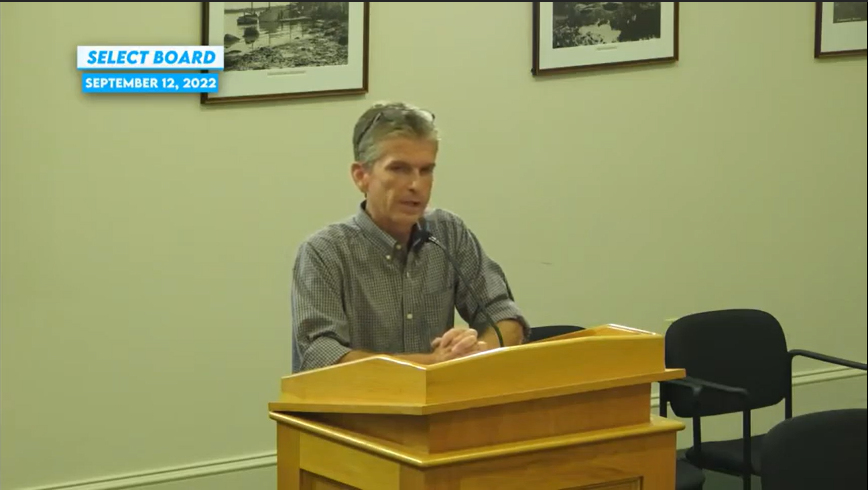Public Health Director makes a stink about New Bedford wastewater discharge
Director of Public Health Christopher Michaud spoke in front of the Select Board at its Sept. 12 meeting to raise concerns that the City of New Bedford has been slow to report wastewater discharges into Clarks Cove, leaving some to swim in contaminated waters.
Such discharges have led officials to close beaches in the cove to swimming and fishing multiple times this summer, but Michaud said the warnings are not always published quickly enough.
He explained that New Bedford’s current plan for combined sewage overflows (CSOs), which was approved by the Massachusetts Department of Environmental Protection, allows the city up to 24 hours to notify the public after a discharge.
“That is the most dangerous time frame after a discharge,” he said.
In other words, swimmers could be exposing themselves to sewage — and the harmful bacteria it contains — for a full day before they are warned of the danger.
Michaud said that state regulations around bathing beaches stipulate that a beach must be closed when a contaminant is known to be present and should not be reopened until the water can be tested to ensure it is safe to swim in.
“[Sewage discharge] is nothing to be taken lightly,” Michaud said at the meeting, explaining that he has stood next to one of the sewer pipes while it was discharged. “I wouldn’t wish anyone or anything to swim in those waters after that pipe has discharged... The smell — what I saw — was horrific.”
Michaud explained that “antiquated” sewer systems, like New Bedford’s, mix street drainage with sewage, leading to the need to discharge excessive flow during heavy rain.
This practice, he said, has existed for years, but only recently were state regulations updated to require cities to inform the public when such discharges occur.
In fact, the law officially came into effect on July 6 of this year. Michaud said the first notification of a sewage discharge came just one day later, on July 7.
Michaud said he has since tried to take the issue of notification times up with MassDEP, sending emails and making phone calls to the agency, but has yet to receive any response.
But, he said, the town may yet have a chance to make its case for a more robust and immediate notification system regarding sewage discharges.
New Bedford will need to present its final plans for dealing with CSOs to MassDEP around the end of the year, giving Dartmouth officials a chance to insert themselves into the discussion and push for stricter regulations.
“I can be a nuisance, like the mosquito in the ear of a person,” Michaud said, “but I think in this case, with the impact on our Clarks Cove beaches… we need a swarm of hornets on MassDEP to protect our interests.”
The Select Board agreed.
“This is a horrible situation,” said Select Board Chair David Tatelbaum.
Board member Heidi Brooks concurred, indicating her disgust that the practice has gone unreported for so long.
“I cannot believe that this is the first year that [these regulations] have gone in,” she said. “So what have people been swimming in prior to this?”
Unfortunately, Michaud said, it is almost impossible to stop these discharges from happening as it would require a fundamental change in the structure of the New Bedford sewer system.
“Correcting these CSOs is a monumental task,” he said.
But the issue could at least be managed more effectively if notifications were sent more promptly and consistently from New Bedford.
That way, Dartmouth officials could start to get an idea of how much rain it takes to cause a discharge, allowing them to predict when they might happen based on weather forecasts.
He said the town should also work on finding new ways of warning citizens when a discharge is happening to make sure they have the most up-to-date information available before they swim.
In the end, the Select Board voted to author a letter to MassDEP as well as State Rep. Chris Markey (D-Dartmouth) and State Sen. Mark Montigny (D-New Bedford) alerting them to the issue and seeking to amend regulations to require quicker notifications and more water testing.












